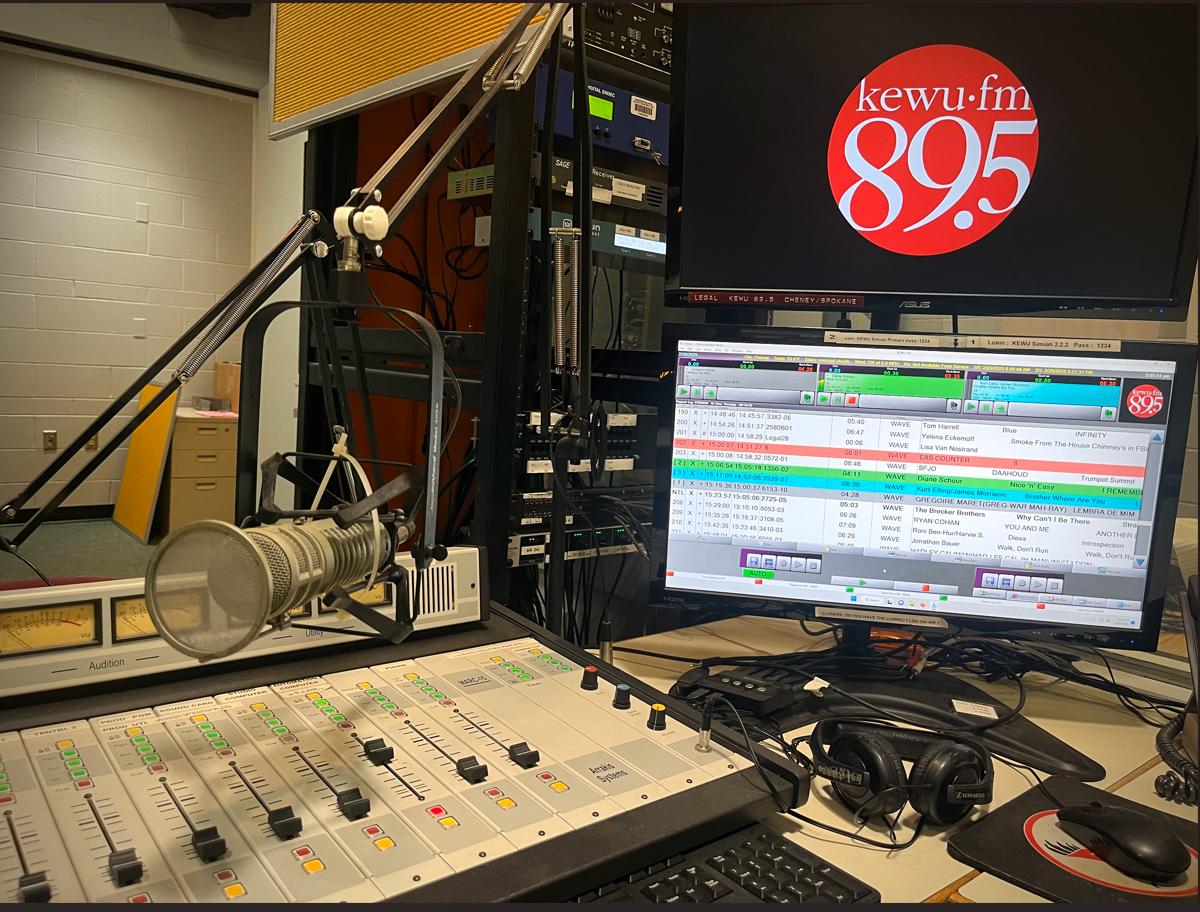EWU instructors and professors affected by work stoppage
By Jane Martin
The windows of the Fox Theater were dark and musicians stood on the sidewalks outside, some with their instruments, waving at passing cars and holding protest signs, striking against symphony management.
After months of negotiations over a proposed contract put forward by the management of the Spokane Symphony Orchestra, the musicians, some of whom are music instructors at EWU, voted to reject the final offer and went on strike on Nov. 3.
Ross Holcombe, a core musician for the Spokane Symphony Orchestra and trombone instructor at EWU, said that as a core musician, his current salary from the orchestra is $17,460 per year. With the administration’s most recent proposal for a 13 percent cut, his salary would be reduced to $15,132 per year.
In a press release on Nov. 2, Spokane Symphony Board President Peter Moye said, “It is with regret that I must announce that after an additional day and a half of intensive bargaining where the Symphony made significant compromises that they felt would bring the sides to an agreement, the musicians have halted the negotiations and called for a strike. It is disappointing that the musicians have chosen to withhold the performance from their audience.”
The press release also stated that, “The Musicians had been working under a contract negotiated in 2006. Musician compensation was based on a guaranteed number of ‘services’ (rehearsals, concerts or educational events) at three different tiers of musicians in the orchestra. The ‘core musicians’ had the greatest number of guaranteed services under the 2006 contract.
With the economic downturn, some programs had to be cancelled and [other programs] anticipated at the time of the contract were no longer possible. Even though it became impossible for the organization to use those guaranteed services, the core musicians were paid for work they never performed. The value of the unused services has ranged from $120,000 to $180,000 annually during each of the last three years.”
“The idea of almost a quarter of your salary being cut is a scary prospect,” Holcombe said. “It’s the musician’s responsibility to be available for the 180 services. … It’s the management’s responsibility to schedule these services. … We are locked into this [and] we couldn’t schedule more services even if we wanted to.”
“[The musicians] have been in negotiations with the symphony since March. … Our contract was set to expire in August. Aug. 30 came and went with no agreement reached,” Holcombe said.
Holcombe said that the musicians of the Spokane Symphony agreed to continue performing under the provisions of their 2006 contract until negotiations had concluded.
The initial proposal from the symphony administration included a 23 percent pay cut for core musicians, according to Holcombe.
Later on in the negotiation process, the symphony offered a second proposal, which Holcombe said included a 13 percent salary cut for the first year of the contract.
In addition to the 13 percent cut, the administration’s proposed contract does not provide for a minimum number of full rehearsals and performances at all in the second year.
“No one in their right mind would sign a contract where they have no idea how much their salary would be cut in the second year,” Holcombe said.
He added that none of the musicians, core or otherwise, were comfortable with the proposal.
Another area of concern for the musicians of the Spokane Symphony was the contract’s much tighter restrictions on personal leave time. The 2006 contract, which Holcombe said was already much more restrictive than the industry standard, only allowed musicians one week of unpaid personal leave per year, provided the musician gave the symphony 30 days notice and made sure that he or she had someone to replace them.
Dr. Lynne Feller-Marshall, bassoon instructor at EWU and core musician for the Spokane Symphony, said, “We are the top orchestra for restrictive leave policies. We’re No. 1.”
Under the symphony’s proposed contract, musicians would be required to provide the reason for taking the time off. If the reason was to perform with another professional group, the leave would be denied, according to Holcombe.
Holcombe pointed out that the symphony ended the last season with a surplus of nearly $30,000 and that the “[Spokane Symphony] income percentage [from ticket revenues] is enviably high in the arts world.”
Moye said in a brief interview that, “[The Symphony was] operating on a deficit budget until the end of last year when some angel donors came up with extra money.”
“When we entered into the contract in 2006, none of us had a crystal ball to see the economic downturn that was coming,” Moye said. “To budget on money that is not guaranteed to come in is not good business.”
Holcombe said, “We are all highly skeptical of the statement that they don’t have money if we finished with a surplus last season and other areas of the budget are being increased.”
The budget showed an increase of 11 percent for guest artists, 6 percent for conductors and 15 percent for administration, according to Holcombe. Moye confirmed the increases in an interview with The Easterner.
When asked about the reasons for these specific increases, Moye said, “We entered into a new contract with the conductors,” and attributed the increased funds going toward administration to a recent merger between the Fox Theater and the Spokane Symphony.
Moye was quick to add that there were no pay increases or new hires in administration. Guest artists, he explained, charge what they want and it is not a matter that the administration can control.
Adam Wallstein, principal timpanist for the Spokane Symphony, said that on Oct. 11, the administration called an impasse in negotiations. “We [the musicians] voted that down,” Wallstein said.
“On Friday, Oct. 19, [the administration] imposed their final offer on the musicians,” Wallstein said.
“Since [the musicians] thought [the management’s] declaration of impasse was premature, we told them we thought it might be illegal,” Wallstein said.
The musicians submitted their grievance to the labor relations board and asked them to mediate to continue further negotiations. A moderator returned to negotiate further with the administration on Nov. 1.
At this point, the management did agree to drop the more restrictive leave plan and to leave it as it was in the 2006 contract. They also agreed to continue to provide bus transportation to Idaho for concerts but would not budge on other issues, according to Holcombe.
At the Nov. 2 negotiation, Holcombe said that, “The musicians offered to take a 6 ⅔ percent salary cut in order to make a concession and keep the organization healthy.”
“We made the last offer,” Walstein said. “The last proposal was on Nov.2. They rejected our offer without any counter offer … and said, ‘Unless you have any further proposals, we’ll be proceeding with the assumption that you are on strike.’… They forced our hand.”
Moye said that The Spokane Symphony Society’s legal team would be in contact with the mediator for The Spokane Symphony about any further negotiations.
Feller-Marshall said, “I’m pretty sure that the board members think, or maybe hope, that the core orchestra members have day jobs with benefits and that [the symphony salary] is the icing on the cake. … The fact is that we are living off of the Symphony.”
“We took a poll and three out of 56 [in the core orchestra] have day jobs with benefits,” Feller-Marshall said.
Both Feller-Marshall and her husband, Dr. John Marshall, are music instructors at EWU. “[The money from the Symphony] is more than half of our household income,” Feller-Marshall said.
When asked how they would be affected if the 13 percent cuts were implemented, Feller-Marshall said, “We would probably consider leaving the area. … I know that many core players would have to leave the area.”
“It’s a little scary,” Feller-Marshall said, “because without any word to the musicians, [the administration] cancelled concerts well in advance.” A total of 16 services, including four performances were officially cancelled in a press release Nov. 7.
“This sounds, to me, more like a lockout,” Feller-Marshall said.

















David Phillip Kobaly • Nov 16, 2012 at 12:09 pm
Like many people in the Spokane/Coeur d’Alene area, I grew up listening to the Spokane Symphony Orchestra. It has been an amazing experience to witness all that they have achieved and accomplished in just the last ten to fifteen years, and their inspiring performances played a powerful role in my decision to become a composer. During my music studies at EWU, I had the privilege of knowing several faculty who are members of the symphony, including Drs. John Marshall and Lynne Feller-Marshall. They are among the finest professionals and educators I have ever known, and I have the utmost respect for them and their enormous contributions to the world of music. It saddens me deeply to see such people undervalued–to see their talents taken for granted by administrative number-crunchers who abuse and take advantage of musicians by using their artistic passion and work ethic against them. The symphony members have bent over backwards, demonstrating their willingness to accept considerable sacrifice and work under hugely unfair conditions for the sake of keeping their art alive. Yet, somehow, this isn’t enough. Perhaps the administrators will only be satisfied when the musicians agree to be paid in dried fish. People think that a musician is just a walking IPOD, whose is morally obligated to make the music everyone feels entitled to hear. Musicians are professionals, artists, craftspeople, laborers. We are the plumbers, masons, engineers, and doctors of our trade and deserve to be regarded as such. We are not court jesters and jugglers here for your amusement. We are purveyors of the art you need and crave. We need to share it just as badly as you need to receive it. Musicians like Drs. Marshall and Feller-Marshall have dedicated hours of every day of every year of their lives since early childhood to developing and cultivating the skills necessary for giving you this music. These skills come only with commitment unyielding enough to endure exhaustive labor, frustration and sacrifice, and they are skills few people will ever have. Symphony members make only enough money to meet their familys’ most spartan needs, much less enough to feel appreciated as artists and financially secure. It’s time to stand together and support our symphony (even if you’re living as far away as California, like I am now). They are a part of Spokane’s family and herritage, and deserve to be shown our appreciation. If we don’t help them, they may have no choice but to leave and find work elsewhere. And if we let that happen, then we DESERVE to lose them!